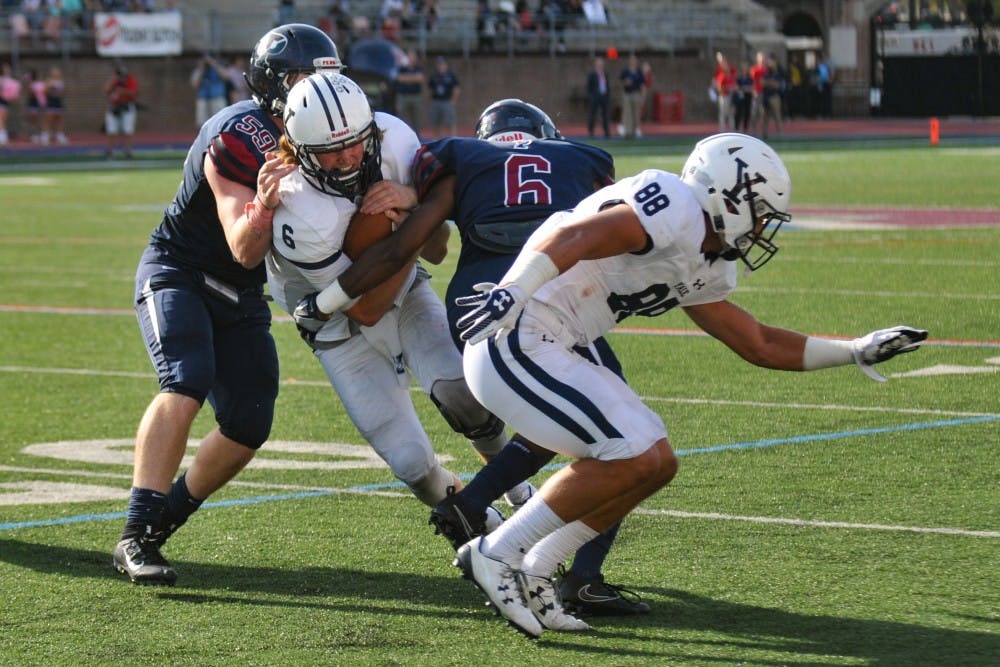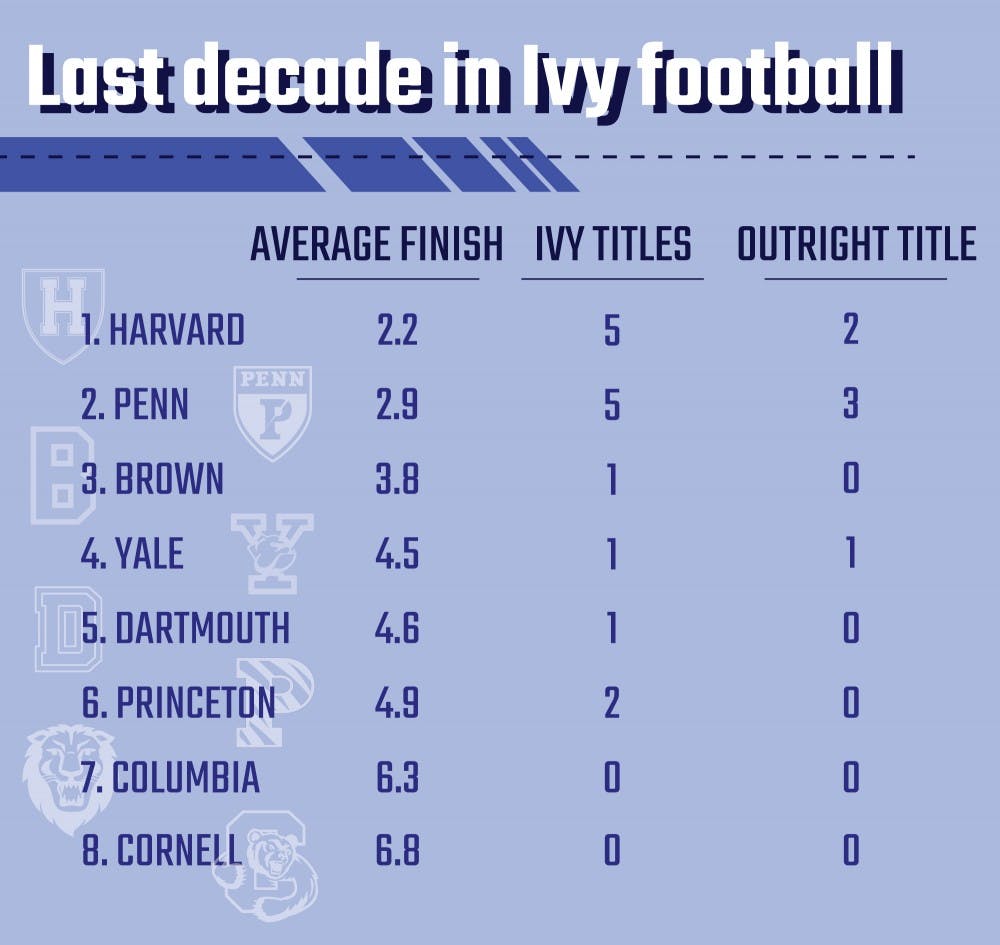
After winning the Ivy League championship in 2017, Yale football looks to be the team to beat once again this season.
Credit: Pranay VemulamadaAs Penn football prepares to face the Ivy League after losing its best player in current Tampa Bay receiver Justin Watson, the other members of the Ancient Eight either hope to maintain current glory or resurge after disappointing seasons. Following Yale’s championship triumph in 2017, it's time to look ahead and see how the Ivy landscape will shape up this season.
Yale Bulldogs — 2017 Record: (9-1, 6-1 Ivy)
In a preseason media poll, Yale was picked to defend it's championship crown. Sophomore running back Zane Dudek, who racked up 1,312 all-purpose yards last year as Ivy Rookie of the Year, is back and is being picked as a preseason All-American. He’ll be expected to lead a powerful Bulldogs offense that put up an impressive 34.5 PPG during its championship run. Junior quarterback Kurt Rawlings also returns to the gridiron after throwing for 2,320 yards in 2017. While their offense is as deadly as ever, the Elis have question marks on the other side of the ball. Yale's top five leading tacklers in 2017 have all graduated, meaning that the core of last year's defense, which let up just 15.6 points per game, is gone. The Elis' defense took another blow when senior defensive lineman and captain Kyle Mullen withdrew from the university. Teams might take advantage of this chink in the Bulldogs’ armor, but there are few offenses out there that stack up to Yale.
Columbia Lions — 2017 Record: (8-2, 5-2 Ivy)
After years mired at the bottom of the Ivy League standings, Columbia finally made a breakthrough last season. Former Penn coach Al Bagnoli led the Lions to their first winning season in over two decades and was named Ivy League Coach of the Year. Unfortunately, the offense that led Columbia to such a successful year lost a key starter in quarterback Anders Hill, thus putting pressure on younger, less experienced players to live up to high expectations. Whoever starts at quarterback will have a strong receiving corps to throw to, led by first-team All-Ivy wide receiver Josh Wainwright. The defense remains solid, although starters were lost on this side of the ball as well. The main strength of this team is its secondary, so as long as the Lions can limit opposing offenses through the air, they have a chance to repeat some of last year's success.
Dartmouth Big Green — 2017 Record: (8-2, 5-2, Ivy)
After finishing in last place in 2016, Dartmouth turned it around in 2017 with a second-place finish. With the return of its strong offensive line, the Big Green might be poised for more success, but a big hole still remains at quarterback. There are multiple candidates for the starting job, including an FBS transfer from Florida. If the team can silence worries surrounding that key position, particularly in its Ivy opener against Yale, then there is no reason the Big Green can’t win their second Ivy championship in the past four seasons. The Big Green’s offense and defense, even last year, didn’t stack up to the League champion Bulldogs. The team definitely has some catching up to do, but surprises are definitely not impossible for this tenured squad.

Harvard Crimson — 2017 Record: (5-5, 3-4 Ivy)
One of the most successful programs of the 21st century, Harvard disappointed last season with a .500 record, even after big wins versus Columbia and Dartmouth. Due to its traditional success, Harvard has no problem with recruiting, so 2017 might end up being a blotch on an otherwise clean record. With the return of quarterback Jake Smith and a solid offensive line, Harvard could raise some eyebrows this year. The Crimson also return with a strong front seven on defense and a deadly rushing attack led by first-team All-Ivy running back Charlie Booker III. If the Crimson can find consistency on both sides of the ball, they might be able to reclaim their former glory.
Cornell Big Red — 2017 Record: (3-7, 3-4 Ivy)
Despite Cornell’s constant struggles, the return of many key parts of their offense might lead to surprising success this upcoming season. Quarterback Dalton Banks returns with almost all of his offensive line, so a revitalized passing attack could lead to a surge in the mere 17.3 points per game put up last year by the Big Red’s offense. Cornell’s defense is its biggest liability heading into this season, as the unit allowed almost 25 points per game last season, although multiple returning starters could transform experience into more success. The expectations for this team aren’t necessarily high, but a .500 season isn't out of the question.
Princeton Tigers — 2017 Record: (5-5, 2-5 Ivy)
Princeton’s 2017 season was more of an anomaly than a disappointment, so it’s not hard to imagine a strong resurgence from a squad that’s returning a majority of its pieces. The Tigers had the best offense in the Ivy League and lost multiple games due to poor defensive performances. Princeton's quarterback situation is unique among the Ivy teams. The loss of last season’s Offensive Player of the Year Chad Kanoff is mitigated by the return of 2016 winner John Lovett and the addition of four-star recruit Brevin White, who turned down an offer from Alabama. The Tigers often play with two quarterbacks on the field at the same time, so this situation will be one to keep an eye on. All-Ivy receiver Jesper Horsted and running back Charlie Volker also make their return to a powerful offense. With key players on defense returning as well, Princeton is a serious threat to cruise through the Ivy League and claim Yale’s crown.
Brown Bears — 2017 Record: (2-8, 0-7 Ivy)
The Bears are coming off their worst season since 2013, after failing to win a single Ivy League game. While Brown has finished in the top half in nine of the past 11 seasons, that is about the best it can hope for this season. With new offensive coordinator Kevin Decker and a new offensive line coach as well, the Bears will hit the field with a revamped offense. Many of Brown’s best players are on the offensive and defensive line, but multiple key figures return from injury and figure to provide a more positive outlook for the team. Brown will need to prove that their revamped offensive system can win games.
The Daily Pennsylvanian is an independent, student-run newspaper. Please consider making a donation to support the coverage that shapes the University. Your generosity ensures a future of strong journalism at Penn.
Donate







